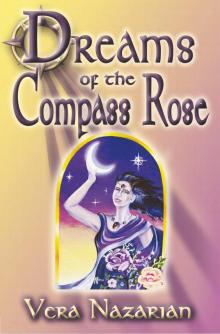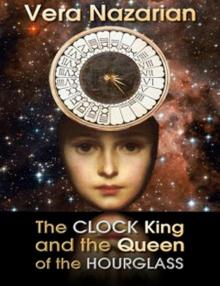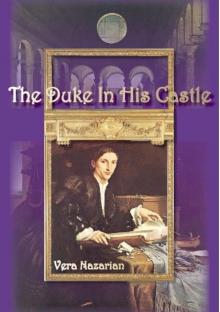- Home
- Vera Nazarian
Cobweb Empire Page 2
Cobweb Empire Read online
Page 2
No!
Percy shuddered, coming “awake” inside her own head, slammed into the present reality, the hardness of the moment. And here she was, drained of all life, drained dry and made empty like a hollow cornhusk.
She took a big breath, and it all came back momentarily, full force—the fullness of power, the cathedral ringing in her mind. It was an overflowing sound of deep bells, and she had been tolling on the inside with the rich darkness, even long moments after it was all over—after she had touched death’s shadow at the foot of her grandmother’s bed, held their hands and pulled the two together—death and the old woman.
To do it, she had reached deep into herself where a tiny bit of death’s heart was lodged like a splinter. It was she, and not someone else.
She did it.
Gran was dead.
She knew it. And she had named herself.
Death’s Champion.
“Percy!”
Someone had spoken behind her. Percy recognized the voice of the only man in the cart, and turned around to look. Vlau Fiomarre, the young dark-haired Marquis, was asking her something, his voice barely raised above a whisper. He was dressed as a shabby servant, nondescript. His once-handsome face was bruised. And his eyes were dark as midnight and almost lifeless with many days of exhaustion.
Percy was immediately reminded of who was in the cart right beside him.
The dead girl.
Claere Liguon, the very Royal and very dead Infanta of the Realm, Grand Princess and daughter of the Emperor, sat on the other side of Vlau Fiomarre. She was like a neatly folded, weightless thing of snow, drained of all blood, brittle and delicate and frozen like spun sugar, covered with the poor disguise of a cheap woolen cloak once belonging to a palace servant. No one but her closest travel companions knew her identity, not even the ordinary ranking soldiers in the knight’s retinue.
“Percy,” repeated Vlau, his eyes glittering in the near dark. “Remember, it is as we had discussed earlier. You will not speak anything of her. We will downplay her presence as much as possible. Please, not a word to your family.”
“Yes, I know.”
And then he added. “What—what has happened in there? Is it but mistaken nonsense, or did you really somehow cause your grandmother to pass on?”
“I—” Percy began.
“How did you do it?” the Grand Princess herself uttered the question, in a laboring voice that was like soft mechanical bellows, whistling slightly, as the breath escaped her dead, frost-filled lungs.
They were all watching her, the other girls in the cart, Emilie, Marie, Niosta, Lizabette, breaths held, all staring.
But before another word was said, there was the sound of quick footsteps from the direction of the house, and another familiar intrusion saved Percy from having to explain the impossible.
“Percy, are you there?” Her eldest sister, Belle, had come hurrying from the front porch, past her stunned parents, stepping right into the deep snow. She was carrying their fine shawl, the one that Niobea had dropped.
Belle, lovely and thin, and shivering in her rough-spun housedress, stood at the side of the cart, ignoring everyone else there, and thrust the length of quality vintage wool into her sister’s hands. “Take this, Percy. It is yours now, by all right. If mother wants you never to enter the house again, then it is yours.”
“I can’t take this, Belle! You know it’s hers, and it’s the best shawl we have.”
But Belle made a small stifled sound, and simply deposited the shawl in her sister’s arms, then turned around and quickly ran back, wading through a tall snowdrift at some point, and returned inside the house, having done her single act of rebellion.
Percy held the shawl awkwardly and watched her turn the corner, heard her parents’ voices on the front porch, and Belle’s single exclamation of protest. Then, the front door banged.
Percy Ayren felt the resounding slam of that door echo in her gut. She then turned back to the denizens of the cart. “The barn is somewhat drafty but warmer than the outside. We can bed down in the hay, next to all the horses—if there’s any room left after the knight and his soldiers take over. I’m sure we’ll have plenty of hot water for tea, though there’s never anything cold-brewed, and not much hope for foodstuff from my Ma and Pa. Supplies are low this time of year. Oh, and of course we can always sleep here in the cart. Indeed, we may very well have to.”
And then she added, “Welcome to my home.”
It had turned out as Percy predicted. After the Chidair men-at-arms made themselves at home in their backyard and barn, stabling the great war charger belonging to the knight and the rest of their horses close together, next to the solitary Ayren family mare in its stall, there wasn’t much room left for any people in the barn, except for one small corner. The black knight, Lord Beltain Chidair had no intention of taking the spot for himself, but Riquar, his bearded second-in-command, insisted, seeing how his Lord was still somewhat weak from the prolonged military ordeal of the past week and a half, and needed a warm place to continue his healing.
And thus, after they had the backyard campfire going, and after they had all eaten the good bread and cheese, drunk the tea from the large water kettle that Belle and Patty carried outside from the house, a few blankets were laid out on the rushes and hay in the deepest corner of the barn. Percy moved some old pails out of the way to make room.
The knight was assisted by Riquar out of his heaviest plate armor, leaving on his hauberk and woolens underneath, and lay down without much protest. In the moments that she could glimpse his lean handsome face framed by the soft wisps of dark brown hair, Percy observed his excessive pallor, the light sheen of sweat on his brow, and knew that the day had taken its toll on him, despite his showing of strength all through the ride.
“Is there anything you require, maybe from within my father’s house, such as additional blankets, My Lord?” she asked, standing above the knight while Riquar pulled at some loose ties of his woolens, adjusting them for his lord’s comfort.
Beltain, leaning back against a blanket-covered pile of hay, barely looked up at her, and his gaze was unfocused at first, because for some reason it now required effort to keep his eyes open. But his words, however soft and weary, were precise. “What did you say? ‘My Lord,’ you said. . . . This is the first time I hear you address me properly. No more ‘Sir Knight’ or ‘you.’ What happened? Have you come to your senses?”
Percy felt a rush of fire in her cheeks, followed by a wash of cold. Good thing it was so dark, with only the campfire outside casting a warm glow through the opened door of the barn. Just enough to show his pallor and glittering eyes, while her own face was backlit in silhouette.
“I don’t know,” she replied plainly. “I suppose, it being my father’s house, and you being here and not—out there in the strange forest—”
“Come, now. Something happened. Or rather—you did something. And it did something to you in turn. Whatever impossible thing you did with your grandmother to grant her death—it’s related, is it not?” He spoke softly, looking up at her. And his slate-blue eyes, their liquid gaze now intent upon her, reflected the radiance of the campfire. “Who are you, what are you really, Percy? Or should I now call you ‘Persephone,’ as you call me ‘My Lord?’”
“No need,” she replied. “I am not really able to—speak of what has happened, nor do I understand it, but I can tell you I am mostly the same. Not entirely, but mostly. Call me what you will.”
She looked at him, expectant, agitated and yet somehow frozen on the outside, forgetting to draw breath, and for once not avoiding his direct gaze. And his gaze was relentless upon her, in silence.
There was a long peculiar pause.
And then at last he took a deep weary breath of his own and said: “Why don’t you bring the sick girl into the barn. What is her name, Emilie? There is room enough here for a few more bodies, next to me. . . .”
“That is kind of you, Sir Kni—My Lord.”
He watched her steadily, and—it occurred to her—seeing only her dark silhouette against the glow outside.
“What of—the other girl?” Percy said, to avoid the continuation of the strained silence, but not daring to mention the Infanta outright.
“No,” he said. “Leave her be where she is. . . . Less apparent, that way. Besides, she is rather well guarded.”
Percy knew he was thinking of the Marquis Vlau Fiomarre, the man ever present at the Infanta’s side. Indeed, why not? Let them both stay in the cart, and call less attention to themselves, instead of being singled out.
Percy nodded then drew away from him at last. She moved past Riquar who was still arranging pieces of armor, past the many horses—including Jack, the knight’s great black warhorse, and Betsy—and slipped outside. She walked in her familiar backyard, made surreal by the presence of camped out soldiers. The once-pristine covering of white snow was now trampled by many feet of men and horses, churned and beaten down into brownish sludge that had frozen into the earth. A fire pit was dug among the snowdrifts where in the spring would have been a long vegetable patch and herb garden.
The remaining girls who had gone to be Cobweb Brides with her, and were now returning home, had found spots for themselves in the yard, to eat and drink tea. She noticed how they lost most of their caution of the knight’s men-at-arms. Little dark-skinned foreigner Marie and street-smart urchin Niosta were both seated near the fire, their threadbare coats pulled tight about them, talking to an older soldier, and there was soft, subdued laughter, and not a few crude snorts from Niosta. Nearby, Lizabette Crowlé, with her somewhat superior big-town airs, was snapping open a burlap blanket, and biting her lip disdainfully in the direction of the giggling sounds. Emilie Bordon, a simple swineherd’s daughter, still rather ill and occasionally coughing, sat deep in the cart with her feet pulled up, a steaming mug in one hand, and a blanket over her head.
However, at the sight of Percy, everyone seemed to glance at her momentarily. Or did she imagine it? The conversations certainly did not cease. But—had they started to look at her strangely, differently, after what had happened with Gran?
Percy tried not to think, and instead touched Emilie’s shoulder gently, saying, “In the barn you go, it’s warm there.” She then helped the girl down from the cart, past the two remaining shapes of the marquis and the Infanta, lying perfectly still next to each other.
One dead, one guarding the dead, thought Percy.
After Emilie was situated in the barn near the already fast-asleep knight and a couple of his men, Percy emerged again, and stood momentarily. She lingered, looking at the scene before her, a scene of superimposed worlds—at these people who had become her strange travel companions, who were about to spend the night in her family’s backyard next to their house, while her parents hid within, and the empty husk that was the body of her grandmother lay on her old bed, in the dark corner, where her death shadow had once stood like a sentinel. . . .
Percy did not know exactly when the tears started to pour—not until her face was streaked with the icy fingers of cold, and each wet streak was like a scratch of cruel claws of winter.
In the first light of dawn, Alann Ayren left to bring Father Dibue, as Niobea had insisted.
Percy, lying huddled in the cart, was awakened from dark abysmal sleep by the sound of their front door shutting, and the creaking porch, and her father’s familiar footfalls crunching against the snow, then receding down the street.
It was strange to hear it from this vantage point, lying outside the house as opposed to within. Percy felt a moment of disorientation, of existential vertigo, forgetting where she was, and then it all came slamming into place.
She had killed Gran.
Percy’s face was cold, the tip of her nose almost frozen, as the wool shawl had come unwrapped around her face in the night, making her skin numb. She stirred in the bluish morass of receding darkness that was the dawn, feeling someone’s body on the other side—it was Marie, still asleep. And beyond her lay Niosta, a small lump under a blanket. A very fine snow had sprinkled them all with a delicate sheen of powder overnight.
Behind them, closer to the back of the cart, slept the Marquis Fiomarre, and furthest in the back lay she whom he guarded.
Lizabette had found a spot in the barn next to Emilie, with the knight and a few of his soldiers, all taking advantage of indoors warmth which Percy herself had given up for the sake of these “houseguests.” And with the other Oarclaven girls gone—they had been dropped off at their respective homes earlier—this gave them all plenty of room to stretch, at least for this night in the cart.
Tomorrow might be a different matter.
But first, there was today to reckon with.
Percy quietly pulled back her blanket, dusting off the light sprinkles of snow, and added it on top of Marie’s blanket. She then crawled out of the cart and went to take care of nature’s business in their familiar outhouse.
By the time she was done, struggling with the extra layers of clothing, some of the soldiers were up also. And so were some of the neighbors, as could be heard from the voices along the street, and the more than usual number of passerby at this early hour.
Come to gawk at me, thought Percy. Gawk at the misfortunate Ayrens and their accursed daughter, and the strange soldiers in their yard.
She allowed herself a few moments of self-pity, and stared dully as two of the men-at-arms set to making a breakfast fire, and one of them placed a well-aged and cured baton of smoked sausage to warm on a spit. Its pungent apple-wood smoke aroma soon wafted throughout the yard. And then, as more people came awake and came out of the barn, and the hungry horses started making noises, she pushed self-pity away, and got to work. The kettle needed fresh water, and then Belle and Patty came out, dressed in their headscarves, coats, and mittens for the outdoors, to help with some of the chores in the backyard camp. Percy observed her eldest sister’s beautiful wretched face, and it looked like Belle had not had any sleep, judging by the dark sunken smudges under her eyes. Meanwhile, Patty looked no better.
“Where will you go?” Belle whispered, taking a moment when no one was paying them attention.
“I don’t know. . . . Letheburg. Maybe farther south.”
“But what will you do there? Why must you go so far? Can’t you just stay here in Oarcalven, maybe stay at someone’s house temporarily until mother comes around? What can you do, so far from home?”
Percy sighed. “I’ve some things to do, Belle. Gotta return a horse and this cart to someone in Letheburg. And—other things to do.”
“But, what things? What crazy nonsense is this? And you have never even been to Letheburg! Are you really leaving home? You can’t! I don’t care what happened, and our father is right, Gran is at peace now! Whatever mother says now, you know she’ll come around—”
“No.” Percy said. And then added, “Is—Gran—”
“She is lying still, in her bed, as she was when you left. Her face is restful and her forehead is cold, I touched her just now. . . . She is gone, Percy. Completely gone. Mother is keeping vigil in a chair next to her bed. She insisted we all touch Gran, to make sure.”
“I was scared,” said Patty then, also moving in to whisper with them. “I am sorry, I didn’t want to touch Gran, not like this. But Ma said to do it.”
“I am so sorry.” Percy softly watched her youngest sister.
“I know. But, don’t be.” Patty was looking into her older sister’s eyes with intensity. “Are you really Death’s Champion, Percy? Is that like being his Bride? Did he give you magic of sorts, death magic?”
“Don’t say such ungodly things, Pat!” Belle began, but Percy interrupted gently.
“I think it may be something like that. I don’t know how exactly, or what it is I did to let Gran go. But Death had assigned me a task that must be done. As a Champion does his Lord’s bidding, so must I do his. But—please don’t tell Ma or Pa, all right? It will only upset
them more. Because, well, thing is—I can see death. I could always see it, for as long as I remember. Or at least, its shadows . . . when they stand next to people, next to the dying. Before, I could only see them, but now . . . now I can also touch them.”
And as Patty and Belle stared at her in growing awe, Percy finished. “With Gran, I think, what I did was put her shadow inside her. I took hold of it, and it obeyed me, like a child. . . . It is not evil at all, just a part of being. It was like a sorrowful wild thing—a thing lost.”
“Oh!” Patty gasped. “So then how—”
“Percy!”
They turned at the sound of a familiar childish voice, and there was Jenna Doneil, their neighbor from a few doors down, and Percy’s fellow Cobweb Bride and traveling companion of the last few days. She waved at them frantically as she ran into the Ayren yard, her poorly shod feet sinking in snowdrifts with each step. Jenna was a skinny, fair-haired child of no more than twelve, and apparently she had run here from her home down the street, bare-headed in the dawn cold, and had barely managed to pull her old coat on.
“Jen? What is it?” said Percy. “Is something wrong? Are you all right?”
“Morning, Jen,” said Belle. “Now, why are you not dressed properly, child? You’ll catch your death of cold in this freezing air—”
And then Belle went silent, likely realizing what she just said, “catch your death.”
But Jenna grabbed Percy’s arm with both her cold little hands, without mittens, and she started pulling at her. “Percy! Oh, Percy, you gotta come with me, please! Come!”
“Where, Jen? What is it? Did something happen at home? Are your parents treating you well, since we returned?”
“No!” Jenna exclaimed, then amended. “I mean, no, they are fine, Ma and Pa both. I didn’t think they would be, but they were happy I returned and wasn’t any kind of Cobweb Bride or anything. But—but, you gotta come, please! It’s awful, I could not sleep, it’s still there in the back of the house, same as it was when we left!”

 Cobweb Bride
Cobweb Bride Survive
Survive![[Atlantis Grail 01.0] Qualify Read online](http://i1.bookreadfree.com/11/atlantis_grail_01_0_qualify_preview.jpg) [Atlantis Grail 01.0] Qualify
[Atlantis Grail 01.0] Qualify Lords of Rainbow
Lords of Rainbow Cobweb Forest (Cobweb Bride Trilogy)
Cobweb Forest (Cobweb Bride Trilogy) Compete
Compete Cobweb Empire
Cobweb Empire Northanger Abbey and Angels and Dragons
Northanger Abbey and Angels and Dragons Dreams of the Compass Rose
Dreams of the Compass Rose Win
Win The Clock King and the Queen of the Hourglass
The Clock King and the Queen of the Hourglass The Duke In His Castle
The Duke In His Castle Old Farts
Old Farts